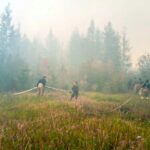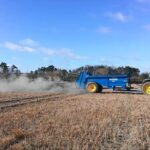Floods of recent decades are unlike those of previous centuries
An international research study l shows for the first time that flooding characteristics in recent decades are unlike those of previous centuries.
Overflowing rivers can...
No more gas boilers for home central heating after 2025
A new Heat Commission convened by the CBI and University of Birmingham - with leading industry figures - has called on the Government to...
Decarbonising social housing: “a pilot won’t fly” in the North West
A new report by IPPR, supported by Housing Association Stonewater – titled: “All hands to the pump: a home improvement plan for England” ,...
Manchester scientists see COVID-19 as historic moment for UK’s environmental future
A leading group of University of Manchester academics are imploring policy makers to use the UK’s post-pandemic recovery as a once-in-a-lifetime opportunity to lead...
Prolonged Siberian heat almost impossible without climate change
The recent prolonged Siberia heat from January to June 2020 would have been almost impossible without the influence of human-caused climate change, according to...
Road verges could be havens for pollinators
Better-managed road verges can help boost pollinating insects, new research shows.
Pollinators such as bees, butterflies and hoverflies benefit from the plants and flowers in...
395 Million New Jobs worldwide by 2030 if Businesses Prioritize Nature, Says World Economic...
The global COVID-19 pandemic has caused unprecedented job losses and economic uncertainty. As governments and businesses look to stimulate growth, a new study from...
Post lockdown traffic getting back to normal but air remains cleaner as congestion is...
Air pollution is lower than expected in some of the UK’s towns and cities, despite a return to almost normal traffic levels, new research...
England faces “serious risk of running out of water within 20 years” say MP’s
There is a serious risk that some parts of England will run out of water within the next 20 years.
Over 3 billion litres, a...
Applying rock dust to croplands could absorb up to 2 billion tonnes of CO2...
Adding crushed rock dust to farmland could draw down up to two billion tonnes of carbon dioxide (CO2) from the air per year and...










